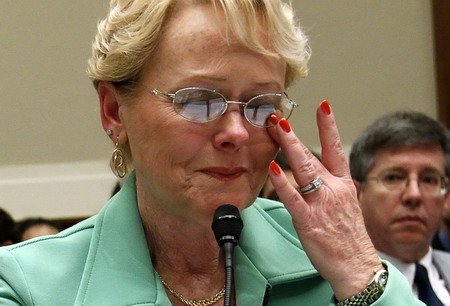Asia-Pacific
Toyota CEO apologizes for recall, accidents
(Agencies)
Updated: 2010-02-24 16:44
 |
Large Medium Small |
|
 Rhonda Smith wipes a tear as she testifies before a House Energy and Commerce Oversight and Investigations Subcommittee hearing on the "Response By Toyota and the National Highway Traffic Safety Administration to Incidents of "sudden unintended acceleration" on Capitol Hill in Washington February 23, 2010. In 2006, Smith's Lexus accelerated to over 100 miles per hour despite her futile attempts to slow the vehicle. [Agencies] |
WASHINGTON: Japanese formality meets freewheeling Washington as the mysterious scion of the Toyota empire apologizes before a House committee investigating deadly flaws that sparked the recall of 8.5 million cars.
Akio Toyoda, the automaker's 53-year-old chief executive, says the company grew too fast to keep up with safety controls.
"We pursued growth over the speed at which we were able to develop our people and our organization," Toyoda said in testimony prepared for delivery Wednesday. "I regret that this has resulted in the safety issues described in the recalls we face today, and I am deeply sorry for any accidents that Toyota drivers have experienced."
An apology won't be enough for the feisty panel of lawmakers on the House Oversight and Government Reform Committee in a year in which every one faces re-election. Nor will any culture gap; Japanese CEOs typically serve symbolic roles akin to figureheads without much power to control operations.
Toyoda at first declined to appear before the panel but acquiesced last week when he was officially invited. He shouldn't expect an easy day.
In harmony-loving Japan, company chiefs are usually picked to cheerlead the rank and file. As the grandson of the company's founder, Toyoda was groomed to play that role?- and even dubbed "the prince" of the auto empire for a time.
Japanese corporate royalty or no, Toyoda is familiar with the United States and its corporate culture. He received his MBA in 1982 at Babson College in Massachusetts. He spent time in California as vice president of a joint venture between Toyota Motor Corp and General Motors Corp, a period the Contra Costa Times described as a stint learning the family business while studying the American mind.
"We do not seek the spotlight," the casual Toyoda was quoted as saying in his first interview. "We try always to be low-key, not to be outspoken."
A dozen years later, the blood from dozens of claims over fatal crashes staining the family dynasty, Toyoda has no choice. A significant chunk of Washington's lobbying industry and some part of the struggling American economy hang on his appearance as it's broadcast around the world.
Toyoda, who speaks halting English, planned to appear with a translator by his side, as well as Yoshimi Inaba, president and CEO of Toyota Motor North America Inc., who is fluent in English.
Transportation Secretary Ray LaHood and David Strickland, the new head of the National Highway Traffic Safety Administration, also were expected to testify. Also scheduled to appear was the mother of an off-duty California highway patrolmen killed with three family members in a runaway Lexus on a San Diego highway in August.
LaHood defended NHTSA in his prepared testimony, saying it has acted aggressively to force Toyota to address safety problems. He told lawmakers Tuesday that the agency is looking closely at whether electronics are to blame.
"We will get in the weeds on this," he testified.
Lawmakers indicated they will continue to push Toyoda for answers on whether his company's top-selling cars and trucks are safe to drive. The Transportation Department's vehicle safety division also faces continued questions over whether it took the problem seriously enough and paid attention to warnings signs with Toyotas long before the recalls.
Toyoda's three-page statement departs somewhat from his native formality. In it, Toyoda emphasizes that he personally test-drives Toyotas. And he makes a personal appeal for credibility.
"My name is on every car," he says.











